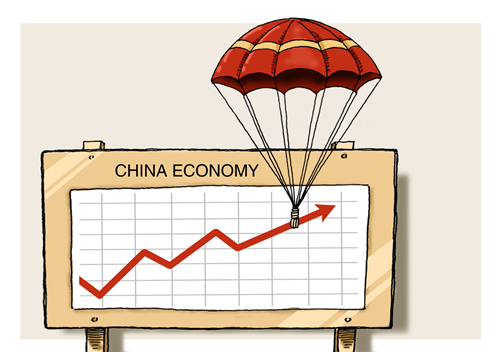Reforms to protect China against looming slowdown
- By Samuel Sherraden
 0 Comment(s)
0 Comment(s) Print
Print E-mail Shanghai Daily, May 16, 2012
E-mail Shanghai Daily, May 16, 2012
 |
|
Bamboo chutes of recovery [By Zhai Haijun/China.org.cn] |
This year, China has announced a flurry of financial liberalization measures that were perceived by many in the United States and Europe as a sign of confidence among Chinese leaders about their economy's growth prospects.
Some analysts, such as Paul Markowski, president of MES Advisers Inc, have argued that these reforms indicate Chinese leaders believe they have avoided a so-called hard landing.
In reality, these measures - such as widening the trading band on the yuan, allowing greater capital inflows and permitting a domestic pension fund to invest in the stock market - are defensive steps intended to protect the economy from a coming slowdown and possibly to boost domestic asset prices.
China's economy is slowing because of weaker demand for its exports in Europe and the US and because it is reaching the limits of its investment-driven growth model.
Growth in electricity consumption and railway cargo has halved since last year and data show that the transition to consumer-led growth is going slowly. As a result, the outlook for China's currency has weakened and capital outflows have become an increasing concern.
These signs of slowdown are the main reasons why Chinese officials have liberalized the exchange rate and tried to counter outflows by encouraging foreign and domestic investors to put more money into the Chinese stock market.
Widening the band
The International Monetary Fund and the US applauded China's decision to increase the trading band of the yuan. Many still see the currency as undervalued and believe exchange-rate liberalization will result in appreciation and a rebalancing of international trade. But Chinese leaders are liberalizing the exchange rate for precisely the opposite reason: They no longer think their currency is undervalued and don't see a "risk" of further appreciation.
Recently, senior Chinese officials including Premier Wen Jiabao and Zhou Xiaochuan, the governor of the People's Bank of China, said the exchange rate is near its "equilibrium" level. The central bank said in its statement announcing the wider trading band that the move was to "promote price discovery" and to "enhance the flexibility" of the exchange rate "in both directions."
You wouldn't know it listening to leaders in the US and Europe, but weakness in China's domestic economy has eroded confidence in the yuan.
Since China widened the trading band, the currency has traded toward the bottom of its permitted range. In Hong Kong, where a limited quantity of yuan trades in an open market, 12- month non-deliverable forwards of the currency trade at about 6.37 yuan per US dollar, a discount to the current 6.31 onshore rate. In other words, the market in Hong Kong is confirming that the Chinese currency may actually depreciate in the coming year.
Band widening is a rational policy choice for a Chinese leadership that believes the currency to be fairly valued. Maintaining a narrower band and tighter control over the exchange rate would raise expectations in the US and Europe that the yuan would appreciate further. Widening the band proves to the West that the yuan is near equilibrium and allows for currency depreciation in the event the economy deteriorates.
In other words, it's an insurance policy for growth in the future. Any currency depreciation that followed foreign-exchange liberalization couldn't be contested by the West.
Boosting stocks
Chinese leaders have also been trying to mitigate economic weakness by encouraging capital inflows, particularly into the domestic stock market. Guo Shuqing, the chairman of the China Securities Regulatory Commission, which oversees the securities market, announced the expansion of the Qualified Foreign Institutional Investor quota to US$80 billion from US$30 billion for approved foreign investors to buy mainland-listed Chinese stocks.
Many observers were quick to label these decisions as moves toward greater openness, but they are better described as efforts to recover recent equity-market losses.
The attempt to boost China's stock market isn't limited to foreign investors. In March, the government announced it would allow the pension fund of Guangdong province to invest in the domestic stock market, a reform that had been prohibited due to high volatility. Only a portion of the 441 billion-yuan (US$70 billion) pension fund is expected to be invested in equities. But Guo is being criticized by some in China for trying to inflate the value of the fledgling stock market and not properly considering the risks of investing in opaque Chinese companies. The accusations may have some merit: Guo said at a conference in February that Chinese stocks were an "exceptional value."
Weaker economy
Rather than seeing China's recent reforms as steps toward greater liberalization, one should see them for what they are: attempts to deal with a weaker economy and a signal of a weaker currency. If China's broader financial liberalization parallels that of Japan from the 1960s to the 1980s, it will take a long time and suffer many setbacks. We shouldn't expect reforms to continue in a linear fashion, but to be adopted as needed.
A broad consensus in US politics holds that American leaders should unconditionally push China to liberalize its currency and open its capital account. But we shouldn't let this view become too entrenched. China's financial system is relatively weak, and it is approaching a difficult domestic transition to consumer-led growth. Insisting that China completely liberalize before these domestic problems are sorted out could risk triggering a second Asian financial crisis and another recession in the US.
The most recent reforms are attempts to stabilize China's economy, not a signal that China's leaders are ready for full liberalization or that they are convinced they have achieved a soft landing.
Samuel Sherraden writes for the Bloomberg View column. The opinions are his own.






Go to Forum >>0 Comment(s)